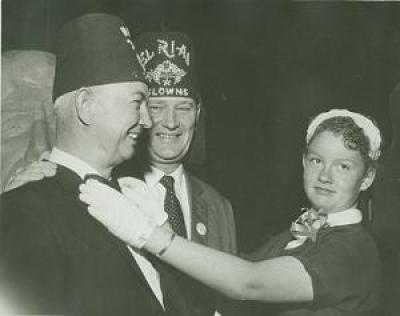Gerald D. Crary
Gerald D. Crary
November 11, 1892 - May 29, 1976
As a child, Gerald Crary rode a stagecoach from Deadwood when his family moved to the Black Hills. Over a half-century later, Gerald would take a stagecoach once again; only this time, he would take it to Detroit.
Gerald was born to Marguerite and Demarest Huntington Crary in Cicero, Illinois, a suburb of Chicago, in 1892. His father was a depot agent for the Burlington Railroad at the time, so it wasn't a surprise when he was transferred to a station in Crow Agency, Montana shortly after Gerald's birth. In 1899 Demarest was transferred again, this time to the railroad's station in Spearfish, South Dakota. The Crary family took the railroad into Deadwood and then transferred to a stagecoach to complete the journey. Since the rail to Spearfish wound precariously through Spearfish Canyon, the stagecoach was certainly the swifter option.
Spearfish became Gerald's childhood home, so he attended school there. He received his secondary education at Spearfish Normal School, which would later become known as Black Hills State University. Gerald studied there for three years before accepting a position with the Fish and Hunter Company in Deadwood in 1910, just two months before his 18th birthday. His first job was a bookkeeper, although he quickly rose through the ranks of the building supply company, eventually becoming a traveling salesman, a secretary and the firm's general manager. His mentor was John Hunter, a well-known Deadwood pioneer who founded the company in 1878.
Shortly after taking the job with Fish and Hunter, Gerald married Lucille Beaman, a Deadwood native. They had two children, Gerald Jr. and Thomas, who both became World War II veterans. Gerald himself entered the military about the same time his sons were born, serving in the Home Guard (known later as the National Guard) during World War I. Gerald and Lucille later divorced, and in 1928 Gerald married Olive Burke, a 26-year-old home economics and English teacher at Deadwood High School. In 1943 Olive gave birth to the couple's only child, a daughter named Margaret.
Gerald gradually fell in love with Deadwood and became involved with a number of community and business organizations, including the Deadwood Chamber of Commerce and the Days of '76 Committee. He was a charter member of Deadwood's Rotary Club and the Tomahawk Country Club. He helped organize the Parent-Teacher Association in Deadwood Public Schools and was one of the first authors of the Trial of Jack McCall, a historically-based drama that's still presented in Deadwood today. Gerald was also a treasurer for the vestry of Saint John's Episcopal Church, and in 1928 he was elected Deputy Grand Exalted Ruler for the South Dakota Elks club. He was a trustee of Deadwood Lodge #508 for more than 35 years.
The community group in which Gerald was perhaps the most involved was the Shriners club. He served as Potentate of Deadwood's Naja Temple in 1942, and in 1946 he was elected to the Imperial Divan of the Shrine of North America. He was elected Imperial Potentate in July 1956, and remains to this day the only South Dakotan ever to rise to that national office. His installation was held in Detroit, Michigan, and in line with Shrine tradition the ceremony was marked by a musical play based on his life. Dr. Warren Lee, the dean of the College of Fine Arts at the University of South Dakota and director of the Black Hills Playhouse, wrote the production to include highlights of Black Hills history. To make it authentic and help promote visitor traffic to the region, Gerald arranged for the original Deadwood Stagecoach to be shipped by special trains to Detroit for the event.
In 1959 a major forest fire erupted on the edge of Deadwood. Gerald was deputized by local authorities during the disaster and was asked to keep the Fish and Hunter warehouses open to supply firefighters with equipment and food. His work during the fire - and over the previous half-century - was recognized by the Fish and Hunter Company in 1960, when the corporation held a banquet in his honor at the Deadwood Masonic Temple. But 50 years of continuous employment wasn't the end of Gerald's career with Fish and Hunter. In 1962 he was made president of the company, a position he held for the rest of his life.
Fish and Hunter's main building on Sherman Street burned to the ground in December of 1961, but the firm simply moved to a building a few doors down. That structure was later sold to Lawrence County and demolished to make way for the Lawrence County Courthouse Annex. The original Fish and Hunter Warehouse, constructed in 1936, still stands today. It was restored and currently serves as Deadwood City Hall and the Deadwood Police Department.
Gerald passed away in 1976. After his death, Olive continued to spend summers at their home at 21 Guy Street in Deadwood and winters at their house in Miami, Florida. Olive died in 2001 and was buried next to her husband at Oakridge Cemetery just outside Deadwood.

